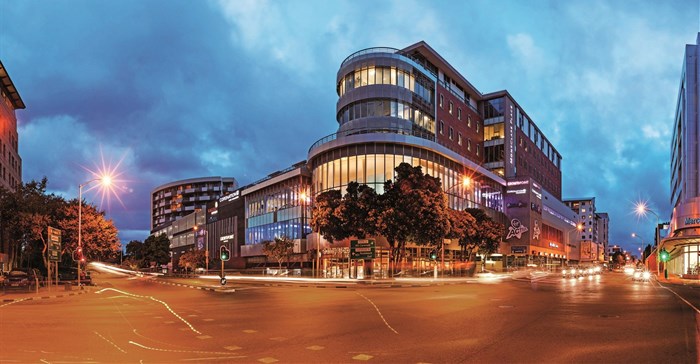Over 20% of Growthpoint Properties' R76.9bn South African property portfolio, not counting its 50% stake in the V&A Waterfront, is located in the Western Cape. With level five water restrictions now in effect in Cape Town, the property investment company has made water saving a priority at its buildings across the city.

Montclare in Claremont
Cape Town’s recently announced level five water restrictions require all commercial properties to reduce their monthly consumption of municipal drinking water by 20% compared to consumption for the previous year. Growthpoint says it is already well on its way to achieving this target.
Growthpoint intensified its focus on saving water at its buildings across the country in February 2016. Already, it has reduced consumption of municipal drinking water by an average of 16%, comparing a 12-month period ending February 2016 with a 12-month period ending July 2017, across its entire Cape Town office portfolio. Growthpoint expects to see even further savings as new data comes in, taking it within reach of a total 20% reduction.
It has achieved even bigger savings at some buildings. Montclare has more than halved its water consumption over the past six months. Here, Growthpoint worked closely with its proactive clients, including Virgin Active, to achieve meaningful savings. Paramount Place has also halved its water consumption from six months ago. Both buildings are in Claremont.
Detailed water audits
Head of sustainability at Growthpoint, Werner van Antwerpen, explains that achieving meaningful water savings at any building that you own, but others use, isn’t easy.
For Growthpoint, the first step to achieving real, quantifiable water savings is knowing exactly how much water each building uses. Office buildings are then benchmarked against the Energy Water Performance (EWP) tool developed by the Green Building Council of South Africa (GBCSA) and co-sponsored by Growthpoint.
Growthpoint has conducted detailed water audits of its office buildings to gauge their water efficiency and improve it.
In February 2016, a solid 40% of Growthpoint’s office buildings performed better than the EWP industry benchmark, which takes 12 months of water consumption into consideration, as well as various other factors. Buildings not performing better than the benchmark were audited to discover the reasons behind their higher consumption, then water savings initiatives were identified and implemented.
By July this year, Growthpoint had improved its benchmark-beating water-efficient buildings to 67%. “We expect to grow this number to 73% in the next six months,” confirms van Antwerpen.
Immediate solutions Growthpoint applied to reduce its buildings’ water consumption include halting all irrigation and water features, installing water-efficient fittings including tap aerators and dual-flush toilets, and working with the clients of its buildings to encourage behavioural change.
Smart water meters
Also, Growthpoint has invested, and is still investing, in smart water meters for several buildings, which is proving to be one of its most successful water saving initiatives. These meters help to quickly identify leaks that could otherwise go undetected for weeks, even months.
Van Antwerpen explains that, conventionally, water meter readings are taken every four weeks by an independent meter reading company. So there is about a six-week delay after the readings are checked and reports generated before seeing a building’s water consumption metrics.
With smart water meters, on the other hand, consumption data is measured every 15 minutes. This allows facilities management teams to respond to leaks within hours, instead of weeks.
“Smart meters have proven to reduce the amount of water lost substantially. Growthpoint is installing smart water meters at most of its P- and A-grade office buildings to measure bulk water supply,” he confirms.
Growthpoint has also ensured that any reports of water problems at its buildings in the Western Cape are automatically designated Priority-1 by the Growthpoint Maintenance Service Desk. It is encouraging anyone who notices a water issue at any of its buildings to report it to the maintenance desk by calling 0860444118 or share it on social media using #GRTwaterwatch, where it will be given top priority.
Growthpoint also has its eye on doing even more in the future by driving innovation to save water and boost environmental sustainability. Some of its projects include greywater recycled from municipal water at Growthpoint’s Bayside Mall which has reduced its municipal drinking water consumption by three million litres each month. The company also has a proof-of-concept running at its own Sandton head office that turns air humidity into water, and the V&A Waterfront is investigating desalination as a water supply.










































